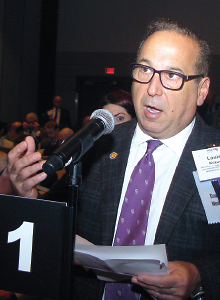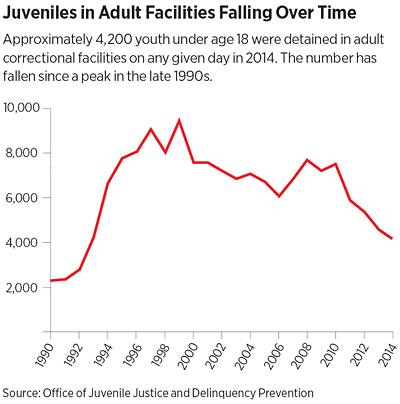Juveniles should not be placed in adult correctional facilities, declared the AMA’s House of Delegates last month in Orlando, Fla.
During the AMA’s policymaking Interim Meeting, delegates unanimously approved the resolution advocating a ban on detention and incarceration of youth in adult correctional facilities.
The policy proposal was crafted by the APA delegation along with the AMA’s Medical Student Section and the delegation from the American Academy of Child and Adolescent Psychiatry (AACAP). The proposal was offered on the floor of the House as a substitute for a moderate, less categorical statement and was enthusiastically endorsed by a wide range of House delegations.
“Kids placed in adult facilities are at increased risk for physical and emotional harm and for being the victim of sexual offenses,” Louis Kraus, M.D., delegate to the APA Section Council on Psychiatry from AACAP and chair of the AMA Council on Science and Public Health, told Psychiatric News after the meeting. “Moreover, staff at facilities are typically not trained in the developmental needs of juveniles.”
Additionally, the House approved policy that supports “early intervention and rehabilitation services, appropriate guidelines for parole, and fairness in the expungement and sealing of records” for juveniles detained in any criminal justice facility.
Kraus explained that in many states, juvenile criminal records are sealed, but that there have been instances in which records have been accessed by third parties.
Estimates of the number of juveniles detained in adult facilities are fluid and vary from state to state. According to the “Statistical Briefing Book” of the Office of Juvenile Justice and Delinquency Prevention (an office within the Department of Justice), on a typical day in 2014 about 4,200 individuals under age 18 were held in adult criminal facilities. The number peaked in the late 1990s, when more than 9,000 juveniles were detained in adult facilities on a given day, and has fallen since then (see chart).
Kraus noted that the unanimous House vote reflects a continued focus on youth in the criminal justice system. In 2014, the House approved policy opposing the placement of juveniles in solitary confinement.
He said the new policy will have a real-world effect on how states detain juveniles. “This offers us additional power in federal and state lobbying efforts to fight for the rights of children in a way that allows them to grow and develop.”
AACAP Alternate Delegate David Fassler, M.D., agreed. “Juveniles do not belong in adult correctional facilities. Such placements increase the risk of abuse and suicide, and reduce the likelihood of successful rehabilitation,” he told Psychiatric News. “I expect the AMA’s new policy will influence other professional organizations. It will also help support ongoing advocacy efforts at both the state and federal levels.”
Other Actions by House of Delegates
The policy was one of two large victories for the APA delegation to the House—the other being approval of a resolution calling on state medical boards to refrain from asking licensure applicants about past treatment for mental illness and substance use disorders (
read more). A list of other important reports and resolutions approved at the meeting appears on next page.
The announcement that Donald Trump won the presidential election came only four days before the AMA meeting began. Thus, discussion of health policy and the future course of the Affordable Care Act—always a source of vigorous debate at the AMA—was suspended in a state of “wait-and-see.”
In his presidential address, AMA President Andrew Gurman, M.D., closed his remarks with comments that appeared to veer off the prepared script.
“This week we shared a moment of tremendous impact in our country,” Gurman said. “A new day dawned Wednesday. … We don’t know if the seas will be calm or rough, but we do have our north star to navigate with. … These are our guides—our mission, our policies, and our values. We will evaluate future changes in health coverage against three metrics: will the proposals cover more, the same, or fewer people?—because we know that people who don’t have insurance live sicker and die younger. Do the proposals promote adequate access, choice, and coverage? And do the proposals advance high-quality care? As long as we adhere to these principles, we will be fine, our patients will be fine, and our country will be fine.” ■
The resolution on detainment of juveniles in adult facilities and other AMA actions can be accessed
here.


